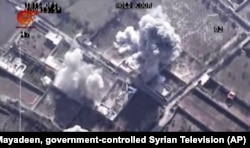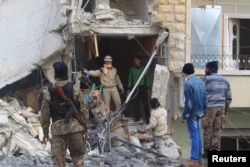Syrian militant groups mourned Saturday the death of a powerful rebel commander who was killed in an airstrike near Damascus, and they named a top military commander as his successor.
Syrian rebels and the government said Friday that Zahran Alloush, founder of the Army of Islam, was killed in a raid that targeted the group's headquarters in eastern Ghouta, a suburb of Damascus.
Alloush's death was a significant blow to the armed opposition, bolstering President Bashar al-Assad ahead of new peace talks scheduled for early 2016.
The Army of Islam appointed Essam al-Buwaydhani, also known as Abu Hammam, as Alloush's replacement .
The strike, which also killed other senior members of the group, came days after the United Nations passed a resolution endorsing a path to peace in Syria.
It also resulted in the delay of a U.N.-brokered plan to evacuate thousands of jihadist fighters under siege near the Syrian capital, monitors and security sources said.
The evacuation of more than 2,000 Islamic State fighters and other militants, plus about 1,500 of their family members, from southern Damascus had been expected to take place early Saturday. But the Britain-based Syrian Observatory for Human Rights said the deal stalled hours after Alloush was killed. Monitors said he was prepared to guarantee the extremists safe passage to the IS stronghold city of Raqqa, as part of the U.N.-backed peace plan.
The evacuation deal was the first of its kind between the Assad government and IS, and it remained unclear late Saturday whether the evacuation would take place at a later time.
The U.N. has not commented publicly on the latest developments. But U.N. negotiators and foreign governments have in recent months stepped up efforts to broker a series of local cease-fires and safe-passage agreements to try to curb fighting.
On Saturday, U.N. Syria mediator Staffan de Mistura said he aimed to convene peace talks January 25 in Geneva. He said those talks would include the "broadest possible spectrum of the Syrian opposition and others," and that they would require the "full cooperation" of all parties to the conflict.
The statement also said continuing developments on the ground "should not be allowed to derail" peace initiatives.
'A turning point'
“The martyrdom of Sheikh Zahran Alloush should be a turning point in the history of the revolution, and rebel groups should realize they are facing a war of extermination by [Russian President Vladimir] Putin's regime,” said Labib Nahhas, a senior member of the Ahrar al-Sham group, which also lost commanders in the airstrike.
“The next stage will witness the liquidation of those leaders who began the uprising,” Abu Hassan al-Muhajer, another senior member of the group, wrote on Twitter, according to The Associated Press.
Other insurgent groups, including Jabhat al-Nusra, the al-Qaida franchise in Syria, lamented Alloush’s killing.
The Army of Islam is regarded by the Syrian government and its most powerful ally, Russia, as a sectarian terrorist group that differs little from more extremist groups like the Islamic State.
The Syrian army claimed responsibility for the airstrike that killed Alloush, saying it had received intelligence on the ground. However, many among the opposition groups blamed Russia's sophisticated spying planes.
Alloush, who was in his mid-40s and had studied Islamic law in Saudi Arabia, was released from a Syrian prison in 2011 as part of an amnesty and then joined the revolt against the government.
His group defended an area that has faced repeated and indiscriminate air raids by the government. His forces, in turn, have fired indiscriminate mortar salvos at areas in Damascus, killing and wounding scores of civilians.
Although Alloush’s forces have battled extremist groups such as the Islamic State, he also had issued statements that appeared sympathetic to Jabhat al-Nusra and al-Qaida's late leader, Osama bin Laden.
Army of Islam
In a recent interview with The Daily Beast, a U.S.-based news and opinion website, Alloush distanced himself from Jabhat al-Nusra, claiming he supported only Abu Maria al-Qahtani, one of al-Nusra’s Sharia advisers. "We saw that Qahtani was showing a moderate face and we wanted to encourage those efforts," he said. "Now al-Nusra has different Sharia advisers, and ours have many disagreements with them, ideologically and intellectually."
Despite the name of his organization, Alloush denied the group wants to spread Sharia in its areas of control. But he was highly critical of democracy.
"The democracy of Assad, the pluralism of the Baath and the Islamism of ISIS are a few examples. The Western double standards are also applied to democracy. While democracy is used to serve people’s interests in the West, democracy is manipulated in our countries to bring villains to rule as agents for outside powers," he said.
"We believe that the future of Syria after Assad should be governed by a technocratic body which has the skills and the qualifications. We do not believe that Syria should be ruled by sectarian or partisan rule, but by a technocratic body that represents the diversity of the Syrian people. We do not see ourselves as Islamic. We are Muslims."
Alloush was also critical of the policies of the Obama administration toward the Syrian crisis.
"America is a powerful country and it can play a major role to end the Syrian conflict if it wants," he said. "But the current administration refuses to play this role and acts with cold blood when it comes to Syria. It has failed to respond effectively to Assad’s massacres, and we saw that obviously when Assad crossed the 'red line' on the use of chemical weapons. America was able to stop the chemical attacks, but it didn’t care.
"Even if the administration didn’t want to intervene directly, it is still able to support the real revolutionary groups which are capable of toppling Assad and at the same time defeating ISIS. Instead, it is promoting weak groups and supporting them just to say, ‘We are doing something for Syria.' "
Push for peaace
Geneva was the site of two rounds of U.N.-brokered peace talks early last year between Assad's government and rebels who have been fighting him since March 2011.
Those negotiations ended with little progress, and momentum for a peace deal evaporated while the conflict became more complex with the addition of Islamic State militants seizing large portions of eastern Syria.
But in recent months, the push for peace has been renewed, including several international meetings bringing together world powers with a commitment to get the warring sides talking again.
Diplomats such as U.S. Secretary of State John Kerry have promoted ending the civil war as the most important step in defeating Islamic State fighters and bringing stability to the region.
The resolution adopted last week by the U.N. Security Council expressed support for a Syrian-led political process, facilitated by the U.N., with the goal of establishing a transitional government in six months and holding elections in 18 months.
The conflict has killed more than 250,000 people and forced half the country's population to flee Syria as refugees or move to another part of the country to escape the fighting.
Smita Nordwall and Chris Hannas contributed to this report.









